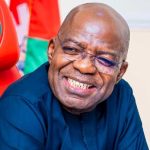Ambode and Cascade of Change, by Ken Ugbechie
 Lagos State Commissioner for Information and Strategy, Steve Ayorinde, assembled a concourse on Victoria Island, Lagos for the public presentation of his latest book. The gathering was a rich mix of politicians, professionals, corporate players, business people and the media. The book with the auspicious title: Cascade of Change – A Decade of Liberal Thoughts, embodies his thoughts and intellectual reflections on Nigeria’s evolving democratic journey.
Lagos State Commissioner for Information and Strategy, Steve Ayorinde, assembled a concourse on Victoria Island, Lagos for the public presentation of his latest book. The gathering was a rich mix of politicians, professionals, corporate players, business people and the media. The book with the auspicious title: Cascade of Change – A Decade of Liberal Thoughts, embodies his thoughts and intellectual reflections on Nigeria’s evolving democratic journey.
Mr. Ayorinde was smart both in the coinage of the title and in his presentation of the book to the public at this time; perhaps, even smarter in getting one of the agents of ‘Change’, Asiwaju Bola Ahmed Tinubu, to write the foreword. Beyond being an occasion for a book presentation, the event provided a rare platform for intellectual engagement; an opportunity to interrogate leadership and the context of citizen participation in governance.
More by default than design, the show cascaded from Mr. Ayorinde’s book to assessment of the first one year in office of Governor Akinwunmi Ambode of Lagos State. The shift was understandable, especially with Professor Emevwo Biakolo of Pan Atlantic University, the reviewer of the book, setting the tone when he wondered how Ayorinde the journalist and therefore an aloof bystander would transit to Ayorinde, the actor on the political stage, albeit the Lagos political ecosystem, without losing at least a pinch of professional flavour. The professor was critical in his disquisition but left the judgment to the reader. Yet, he submitted that Ayorinde must be of the brilliant stuff, especially in his ability to marry his professed love for Wole Soyinka’ s unjournalistic style of writing which leans more on obscurantism with his own lucid, easy-to-understand style. The book reviewer did not stop there; he gave a rather veiled but profoundly manifest hint that from Ayorinde’s didactic espousals, it was easy to deduce that the leitmotif of the book is the Change as epitomized by Governor Ambode in Lagos.
Never doubt a professor; for as the scholar noted, the discourse at the event switched from the writer to the subject. Right from the Chairman of the occasion, Aremo Segun Osoba, himself a fine writer and distinguished journalist (the first Nigerian journalist to win the Niemann Foundation Fellowship at Harvard) to the keynote discussants the talk centred on the relevance of Lagos as the epicentre of Nigeria’s march through the hallway of development and the imprints of Governor Ambode in providing a reliable compass for socio-economic change for the larger Nigerian nation.
The recurring tenor in the discourse was Ambode’s uncommon humility to subject himself to mentorship. For someone as precocious as Ambode, he made the second best result in Higher School Certificate (HSC) examination in the entire West Africa in 1981, graduated from the University of Lagos at 21 and became a Chartered Accountant at 24, he resisted the juicy pot of joining the highly rewarding private sector at that time, instead he elected to join public service in Lagos State where he gave a good 27 years of outstanding service, gleaning off high-profile recommendations, awards and recognition in the process. This was where Ambode the leader was baked – in the oven of the Lagos State public service at all levels.
Like Osoba poignantly noted, he came prepared for the job of governance. His curriculum vitae mirrors the odyssey of a man who knew where he was headed. A Fulbright scholar, he has crisscrossed the corridors of knowledge, leadership and public service administration. But he remains coy about his accomplishments and has continued to earn the respect of noteworthy Nigerian elite. One of his admirers and Nigeria’s foremost political economist, Professor Pat Utomi, told the audience how he had felt disappointed during the first 40 days of Ambode as Governor. To him, it was a darkling period of lull and lethargy in Lagos which he called the ‘first 40 days blues’.
But Professor Utomi admitted his shock at what followed after the first 40 days inertia. Ambode simply flipped the page. Obviously, he had spent the first 40 days putting his thoughts on paper, building his team and breaking down the vision into actionable timelines. This is the hallmark of great leaders. They create time to think, plan and act on their plans. The Lagos example of leadership typified by Ambode is the model of change that should be replicated in Abuja and in other states.
Ahead of the governorship election of 2015, Ayorinde had argued in one of his essays that Ambode, not any other contestant, was the man fit for Lagos. He made an incursion into Ambode’s pedigree, his evolution from the household of a disciplinarian father – a teacher – and community service-oriented mother; his precocity and inclination to learning, his tempered temperament which lends him to leadership and his unvarnished humility, a virtue ingrained in him from home.
Speaker after speaker including President Muhammadu Buhari represented by his spokesman, Mr. Femi Adesina, lauded the effort of the author in helping to deepen the intellectual content of the nation’s democracy.
If anybody was ever in doubt of Ambode’s humility, such doubt dissolved immediately the Governor mounted the rostrum to speak. Apparently not comfortable with the outpouring of encomiums on him and his government of barely one year, he reminded the audience that the show was for Steve Ayorinde and not for him. He refused to ride on the crest of plaudits showered in his path; he demurred at embracing the suffusion of praises from the speakers. Rather, he pointedly gave all credit to Mr. Ayorinde whom he said represents a generation of conscious and conscientious journalists.
The governor traced his relationship with the author to many years back, his pivotal role during his campaign and the role he has continued to play in his government as the conveyor belt for information between the government and the people and vice versa.
In more cases than one, public office holders in Nigeria have a tendency to be swept by the tide of praises and laudatory massage propelled by the anticipation of political patronage but not Ambode. He was blunt and categorical in his deflection of the praises to the man his colleagues simply address as Steve. It says so much about the character of the Governor not to usurp the glory of even his lieutenants. It is a testimony to Ambode’s inclination to fairness. He capped his brief remark by turning to Mr. Ayorinde and with measured and deliberate emphasis told him to the acclamation of the audience that “all of us in the Lagos State cabinet are proud of you”.
Without a doubt, Cascade of Change has added to the growing political literature in the nation’s democratic space. But beyond that, it has provided a sturdy reassurance to Lagosians and Nigerians in general that with Ambode at the helm, Lagos is in safe hand. The Governor himself has proven to be a listening leader. Some persons at the event testified to how they reported cases of bad roads in their neighbourhoods through social media and in a matter of days, actions were taken by the governor.
The underpinning import of the book is that governance need not be complicated. The actors in government must of necessity cultivate the culture of thinking, planning and acting on their plans. This is the template of governance in Lagos State and it is of little wonder that Ambode is largely perceived to be working in a season when efficiency in government is wearing away.
- First published in Sunday Sun, July 3, 2016








